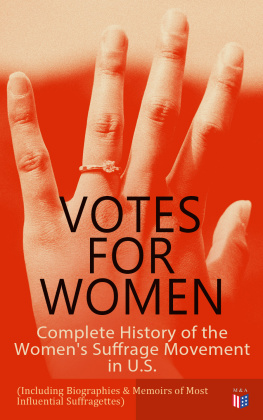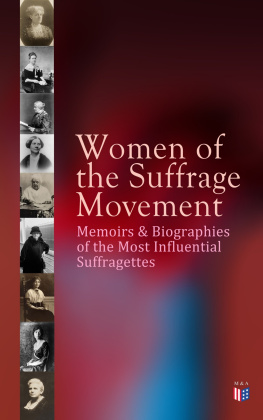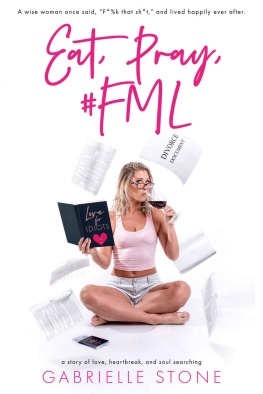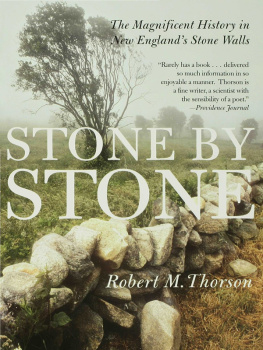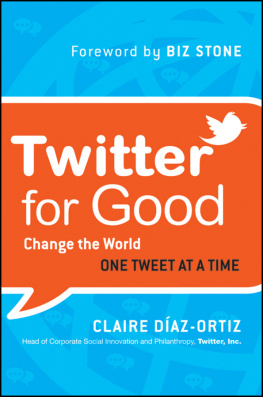Preface
Lucy Stone was noteworthy for many things. She was the first Massachusetts woman to take a college degree. She was "the morning star of the woman's rights movement", lecturing for it, in the ten years from 1847 to 1857, to immense audiences all up and down the country. She headed the call for the First National Woman's Rights Convention. She converted Susan B. Anthony and Julia Ward Howe. She was the first married woman to keep her own name. She organized a nation-wide association in which those suffragists could work who did not wish to have equal suffrage mixed up with free love and other extraneous questions. She founded and edited the Woman's Journal of Boston, which was the principal woman suffrage newspaper of the United States for almost half a century. She was a striking example of single-hearted and lifelong devotion to a great idea.
Her husband, Henry Browne Blackwell, had great ability, and was the one man in America who devoted his life to securing equal rights for women.
One of her sisters-in-law, Doctor Elizabeth Blackwell, was the first woman in modern times to take a medical degree. Another, the Reverend Doctor Antoinette Brown Blackwell, was the first woman in the world to be ordained as a minister. Lucy Stone was thus in close touch with the movement to open the learned professions to women. Her letters give a graphic picture of early American life, as different from the life of to-day as that of some remote foreign country.
Great obligations are due to a large number of friends who subscribed a sum of money to provide me with help while writing this biography. This enabled me to have the assistance of Mrs. Ida Porter-Boyer, who has given invaluable aid in collecting and arranging the material.
Alice Stone Blackwell
Boston, Massachusetts
Chapter I
Lucy Stone was born on August 13, 1818. She was the eighth of nine children. Her mother, a farmer's wife, had milked eight cows the night before Lucy was born, a sudden shower having called all the men of the family into the hayfield to save the hay. When told of the sex of the new baby, she said sadly, "Oh, dear! I am sorry it is a girl. A woman's life is so hard!" No one then could foresee that the little girl just born was destined to make life less hard for all the generations of little girls that were to follow.
The world upon which little Lucy first opened her bright eyes was very different from that which greets the young women of to-day. No college or university admitted women. There was not a single free public high school for girls. It was the general belief that all the education a woman needed was enough to enable her to read her Bible and keep her household accounts, and that any attempt to give her more would spoil her for a wife and mother.
In most States of the Union all those where the law was founded upon the common law of England a husband had the legal right to beat his wife, "with a reasonable instrument." There is a story that Judge Buller, when charging the jury in a case of wife-beating, said, "Without undertaking to define exactly what a reasonable instrument is, I hold, gentlemen of the jury, that a stick no thicker than my thumb comes clearly within that description." A committee of women waited upon him the next day to learn the exact size of the judge's thumb.
Wife-beating, unless done with uncommon brutality, was sanctioned not only by law but by public opinion. Mrs. Emily P. Collins (who organized at South Bristol, New York, in 1848, the first local woman's rights society in the world) says in her reminiscences:
"In those early days a husband's supremacy was often enforced in the rural districts by corporal chastisement, and it was considered by most people as quite right and proper as much so as the correction of refractory children in like manner. I remember in my own neighborhood a Methodist class-leader and exhorter, esteemed a worthy citizen, who, every few weeks, gave his wife a beating with a horsewhip. He said it was necessary, in order to keep her in subjection, and because she scolded so much."
Mrs. Collins added that it was no wonder the poor woman sometimes scolded, as she had to care day and night for six or seven small children, besides cooking, cleaning, milking cows, making butter and cheese, and spinning, weaving and sewing all the clothes for the family. The United States in those days was mainly agricultural, and most farmers' wives led similar lives of excessive toil.
In the matter of legalized wife-beating, Massachusetts was a shining exception. Away back in the seventeenth century, Judge Sewall, of witchcraft fame, secured the passage of the following, among the "Liberties" adopted by the General Court:
"Every married woman shall be free from bodily correction or stripes by her husband, unless it be in his own defense, upon her assault. If there be any just cause of correction, complaint shall be made to authority assembled in some court, from which only she shall receive it."
But all a married woman's property and earnings belonged to her husband. He had the sole control of the children while he lived, and, if he died before her, he could will them away from their mother to strangers. A wife had hardly more legal rights than a minor child. She could not make a contract, could not sue or be sued, and could not make a valid will without her husband's consent, unless she left everything to him, in which case his consent was taken for granted.
When a wife died, her husband had the life use of all her real estate, if they had ever had a child born alive. When a husband died, the widow was entitled to stay only forty days in the house without paying rent, and she had the life use of only one third of his real estate.
The injustice of the laws was not due to any especial depravity on the part of men, but merely to the self-partiality of human nature. If the laws had been made by women alone, they would probably have been just as one-sided, only it would have been the other way around. Even the best men thought that the existing conditions were right. As Henry B. Blackwell said, "No governed class was ever yet without a grievance. Yet no governing class has ever been able to see that the grievance existed."
Public opinion was even harder upon women than the law. All the learned professions were closed to them. Women who had their living to earn were limited to a very few poorly-paid occupations. When a merchant first employed a saleswoman, the men boycotted his store, and the women remonstrated earnestly with him on the sin of placing a young woman in a position of such "publicity" as behind a counter.
There were no organizations of women except the church sewing circles. Public speaking by women was unknown. Even to write for publication was thought unwomanly. The gentle Charles Lamb himself said, "The woman who lets herself be known as an author invites disrespect." Law, religion and custom affirmed the inferiority of women and their duty to remain in silence and subjection; and this belief enwrapped every baby girl in her cradle, like an invisible strait-jacket.



